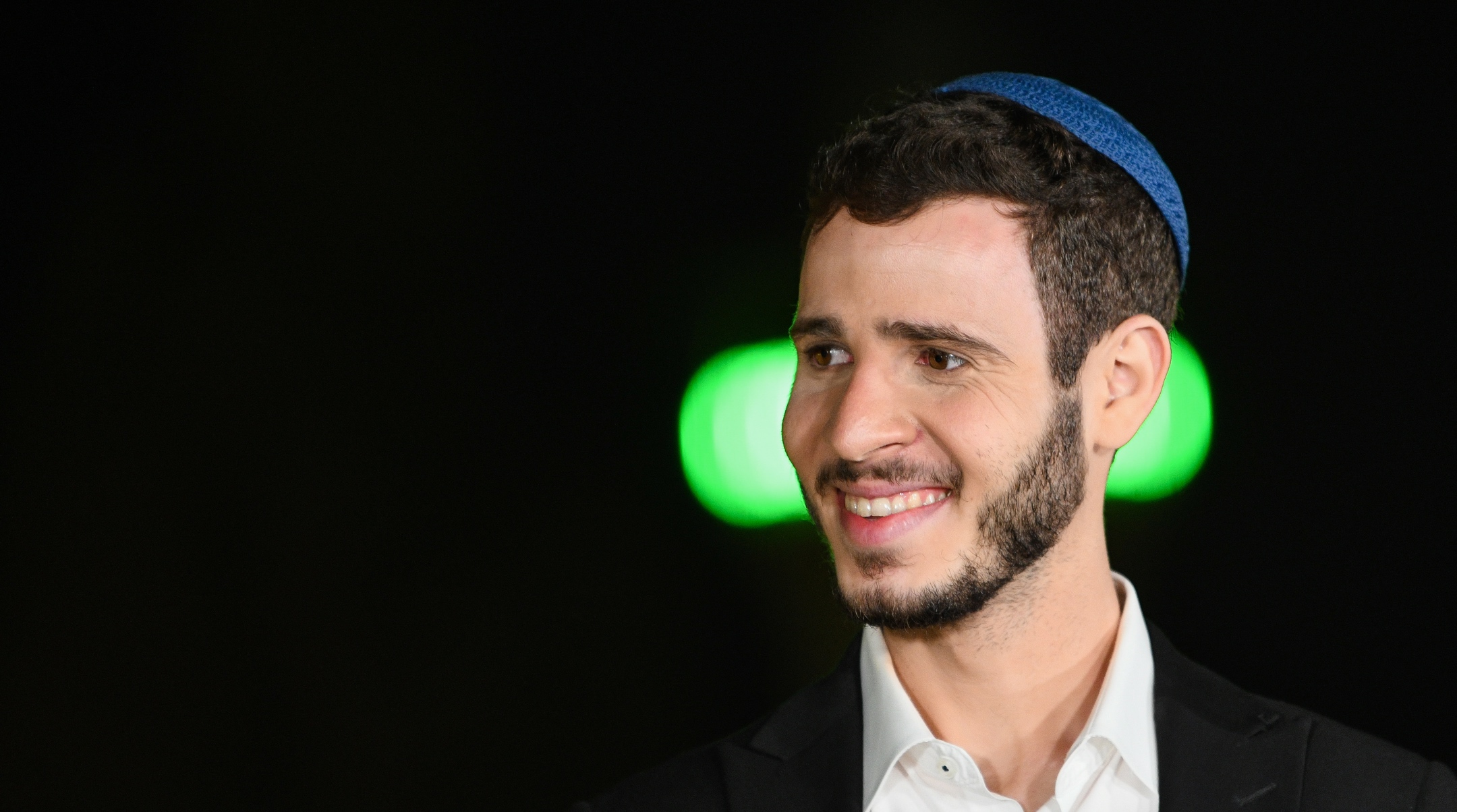Yair Cherki is famous for making Israelis understand Haredim. Now he wants Haredim to understand that he’s gay.
“I love guys. I love guys and the Kadosh Boruchu,” a reporter famous for reporting on the Haredi community tells Israelis

Channel 12 News reporter Yair Cherki reports live from the Western Wall in the Old City of Jerusalem, as tens of thousands of people arrive for a final forgiveness prayer, early on Oct. 4, 2022. (Arie Leib Abrams/Flash90)
(JTA) — Yair Cherki, the religion reporter for Israel’s Channel 12, gained a name for his sidecurls, his cheery demeanor and his rapid fire delivery as he has guided his viewers into the lives and homes of Israel’s Haredi community.
On Tuesday, he delivered a different sort of message — a wrenching personal statement posted to Facebook.
“I love guys. I love guys and the Holy Blessed One,” a religious term for God, Cherki wrote. “It’s not a contradiction, and it’s not new.”
He went on to describe how he had grappled with a secret that had tormented him.
“I have always lived with the clash between this sexual preference and faith,” he wrote. “There are those who solved the conflict by saying there is no God, and there are others who have said there are no gays. In my flesh, I know they both exist and I try to resolve this internal conflict in multiple ways.”
What may have been surprising, beyond the content of the announcement itself, was the outpouring of support for Cherki evinced across Israel’s political spectrum.
“I love you my dear brother,” former Israeli Prime Minister Naftali Bennett, who is Orthodox, wrote on Twitter. “And I am very proud of you.”
Amir Ohana, the openly gay speaker of the Knesset from the Likud Party, responded with a heart emoji.
“This text is so beautiful and moving,” commented Meirav Michaeli, the leader of the left-wing Labor Party. “Thank you for giving it to all of us.”
Also flooding Cherki’s mentions were rivals from Israel’s usually cutthroat media world. “What a joy you are, Cherki,” wrote Shaul Amsterdamski, the finance reporter for the rival Kan network, Israel’s public broadcaster. (Channel 12 is privately owned.)
His public coming out comes at a time that far-right figures in Israel’s new government have shown an appetite for curbing the rights of the LGBTQ community.
Cherki said he would not quit his faith. “My community is still the religious community,” he wrote. “My tribe, my family and my friends. These are my beliefs.”
Not every Israeli was ready to understand, but some still spoke in loving terms.
“This post made me very sad,” commented Yehuda Glick, a former Likud lawmaker who leads a movement to allow Jewish worship on Jerusalem’s Temple Mount. “It doesn’t change the fact that I love you not a single gram less than I loved you before I read it. But in total honesty, it’s a gut punch.”
Uriah Elkayam, a journalist, replied to Glick: “These kind of responses from you and your cohort crush souls and drain the lifeblood from people, because you think you are better Jews. This is a time to hug, or to shut up.”
Cherki, 30, rake-slim, generally sports a dark blue kippah and dark casual clothing.He recently cut off his payos, the sidecurls kept by haredi men.
Cherki made his mark in TV news by taking viewers into the homes of his fellow Haredim and asking them, in gentle, urgent tones, to explain why they believed what they believed.
He endeavored to keep Haredim from being reduced to cliches. A Haredi Knesset cafeteria worker who invited Cherki and another reporter into his home described his admiration for Bennett. The cafeteria worker also explained why he disagreed with Bennett profoundly on issues of national security, and was ready to vote for Itamar Ben-Gvir, the far-right, religious Zionist politician currently serving as Israel’s national security minister.
Cherki pointed at a cabinet stacked with the writings of the late Sephardic sage, Rabbi Ovadia Yosef, who founded the Haredi Shas Party. “A Shas house!” he said — a way of noting for viewers that parties which have traditionally represented Haredi Israelis no longer had a grip on their natural constituents.
Cherki’s job also led him into awkward encounters. In a segment on Haredi marriage, a matchmaker he interviewed chided him for not yet getting hitched.
He has been at pains to make clear that he is a believer. Last year, he explained how Haredim in B’nei Brak, a city north of Tel Aviv, were coping with the aftermath of a terror attack. Many believed that the heavily haredi city no longer had the protection of Rabbi Chaim Kanievsky, an eminent sage who had died days before the attack, and whom they believed protected the city.
The anchorman, Rafi Reshef, asked Cherki incredulously whether he bought into the “narrative” that Kanievsky had protected B’nei Brak.
Cherki shot him a pained look and said it was “a little bit of a private question.” Cherki said.
“I generally believe that the role of righteous people in the place where they live, there is significance,” he said. “The question of, if just because a rabbi died, at that moment, B’nei Brak is more vulnerable than before, is bigger than me. But I can understand and tell you the spirit and the thought processes of people who believe that.”
Reshef apologized. Cherki smiled.
Cherki also speaks to secular Israeli groups about the world of haredi Jews. “If I had to put in a single sentence what I’m trying to do on TV when I talk about Haredim, I want to say ‘They’re not all the same,’” he told a bar full of secular Israelis last month on a TV show that brings together different sectors of Israel’s deeply divided society..
This article originally appeared on JTA.org.























